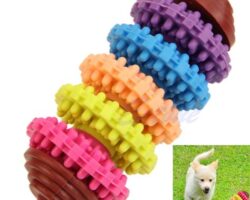The health and well-being of our furry friends is of utmost importance, and one area that often gets overlooked is their dental hygiene. Just like humans, pets need regular oral care to maintain a healthy mouth and prevent problems such as bad breath, plaque buildup, and periodontal disease. In this blog post, we will explore a variety of options available to pet owners to ensure their pets have healthy smiles. From toothbrushes and toothpaste to specially formulated diets and professional dental cleanings, we will cover all the bases for optimal pet dental health.
Toothbrushes and toothpaste for pets
When it comes to taking care of our pets’ dental health, toothbrushes and toothpaste play a crucial role. Just like humans, pets also require regular oral care to maintain their dental hygiene. Using the right toothbrush and toothpaste specifically designed for pets can help prevent dental issues such as plaque buildup, gum disease, and bad breath.
Firstly, let’s talk about pet toothbrushes. Unlike our own toothbrushes, pet toothbrushes are designed with softer bristles to ensure they don’t harm our furry friends’ delicate gums. These brushes also come in various sizes and shapes to cater to different types of pets, such as dogs, cats, and even small rodents. Investing in a good quality pet toothbrush is essential for effective dental cleaning.
Secondly, choosing the right toothpaste for pets is equally important. Pet toothpaste should never contain fluoride, as it can be harmful if ingested by our pets. Instead, specialized pet toothpaste usually contains enzyme-based ingredients that help fight plaque and tartar buildup. These toothpastes also come in flavors that appeal to our pets, making the brushing experience more enjoyable for them.
Now, let’s explore the benefits of regularly brushing our pets’ teeth. Firstly, it helps to prevent plaque and tartar buildup, which can lead to gum disease if left untreated. Regular brushing also helps to eliminate bacteria that can cause bad breath in our furry companions. Additionally, by maintaining good dental hygiene, we can minimize the risk of tooth decay and tooth loss in our pets. Therefore, incorporating a toothbrushing routine into their regular grooming regimen is highly recommended.
Benefits of brushing your pet’s teeth with a toothbrush and toothpaste:
- Prevents plaque and tartar buildup
- Eliminates bacteria and prevents bad breath
- Reduces the risk of gum disease and tooth decay
- Promotes overall dental health and hygiene
How to brush your pet’s teeth:
| Step | Instructions |
|---|---|
| 1 | Introduce your pet to the toothbrush and toothpaste gradually to familiarize them with the process. |
| 2 | Gently hold your pet’s mouth and lift their lips to expose their teeth and gums. |
| 3 | Apply a pea-sized amount of pet toothpaste onto the toothbrush and start brushing in small circular motions. |
| 4 | Focus on the outer surfaces of the teeth, as plaque tends to accumulate there. |
| 5 | Gradually increase the duration of brushing sessions as your pet becomes more comfortable. |
| 6 | Reward your pet with praise and treats after each successful brushing session to reinforce positive behavior. |
In conclusion, toothbrushes and toothpaste designed specifically for pets are essential tools for maintaining their dental health. Regular brushing using these products can help prevent dental issues, promote fresh breath, and ensure our pets’ overall well-being. So, make sure to incorporate a toothbrushing routine into your pet’s grooming regimen and consult with your veterinarian for further guidance on dental care.
Dental chews to promote oral hygiene
In recent years, pet owners have become more aware of the importance of maintaining their pets’ oral hygiene. Just like humans, pets can suffer from dental issues such as gum disease, tartar buildup, and bad breath. One of the effective ways to promote oral hygiene in pets is by using dental chews. These chews are specially designed to help clean your pet’s teeth and gums, while also providing them with a tasty treat.
Dental chews are made from a variety of ingredients that have specific benefits for your pet’s oral health. They often contain enzymes that can help to break down tartar and plaque, reducing the risk of dental problems. Additionally, some dental chews have a texture that can help to mechanically clean your pet’s teeth as they chew.
Using dental chews as part of your pet’s oral hygiene routine can have several benefits. Firstly, they can help to remove food particles and bacteria from your pet’s mouth, reducing the risk of gum disease and tooth decay. Secondly, the act of chewing on a dental chew can stimulate saliva production, which can help to naturally combat bad breath. Finally, dental chews can be a great source of mental stimulation and entertainment for your pet, keeping them occupied and satisfied.
- Dental chews are a convenient and easy way to help maintain your pet’s oral hygiene.
- They can help to reduce the risk of gum disease, tartar buildup, and bad breath.
- The enzymes and texture in dental chews can help to break down tartar and mechanically clean your pet’s teeth.
- Regular use of dental chews can provide mental stimulation and entertainment for your pet.
| Benefits of Dental Chews | Ingredients |
|---|---|
| Reduces risk of gum disease | Enzymes |
| Helps to break down tartar and plaque | Texture |
| Improves breath freshness | |
| Provides mental stimulation |
Water additives for fresh breath and plaque prevention
Water additives for fresh breath and plaque prevention are becoming an increasingly popular option for pet owners looking to improve their furry friend’s oral hygiene. These additives are designed to be added to your pet’s drinking water, providing a convenient and effortless way to combat bad breath and prevent plaque buildup.
One of the key benefits of using water additives is their ability to freshen your pet’s breath. Bad breath, also known as halitosis, can be an unpleasant side effect of poor dental health. By adding a water additive to your pet’s water bowl, you can help keep their breath smelling fresh and clean.
In addition to freshening breath, water additives are also effective in preventing plaque buildup. Plaque is a sticky film composed of bacteria, food particles, and saliva that forms on the teeth. If left untreated, plaque can harden into tartar, leading to dental diseases such as gum inflammation and tooth decay. By incorporating a water additive into your pet’s routine, you can help reduce the formation of plaque and maintain good oral health.
When choosing a water additive for your pet, it’s important to select a product that is specifically formulated for their needs. Look for additives that are made with ingredients known to promote dental health, such as enzymes that break down plaque and freshen breath. It’s also essential to follow the recommended dosage instructions provided by the manufacturer to ensure the best results.
Benefits of using water additives:
- Freshens breath
- Prevents plaque buildup
- Convenient and easy to use
- No brushing required
- Supports overall oral health
In conclusion, incorporating water additives into your pet’s oral care routine can have several benefits. Not only do they freshen your pet’s breath, but they also help prevent the formation of plaque, keeping their teeth and gums healthy. Remember to choose a water additive specifically formulated for pets, and follow the recommended dosage instructions for optimal results. With regular use, water additives can be a valuable addition to your pet’s dental care regimen.
Oral rinse solutions for periodontal health
Periodontal disease is a common dental problem that affects many pets. It is an inflammatory condition that affects the gums and tissues surrounding the teeth. If left untreated, periodontal disease can lead to tooth loss and even affect your pet’s overall health. Luckily, there are oral rinse solutions available that can help promote periodontal health in our furry friends.
Oral rinse solutions play a crucial role in maintaining good oral hygiene for our pets. These solutions are typically made with ingredients that help to reduce plaque and tartar buildup, fight bacteria, and freshen their breath. The use of oral rinse solutions can help prevent gum inflammation and the progression of periodontal disease.
A key benefit of using oral rinse solutions is their convenience. Unlike brushing your pet’s teeth, which can be difficult and challenging, using an oral rinse is much easier. Simply pour the recommended amount of solution into your pet’s mouth or mix it with their drinking water, and the solution will work its magic. This makes it a great option for pets who are not cooperative or those who struggle with dental cleanings.
When choosing an oral rinse solution for your pet, it is important to consider their specific needs. Some solutions are designed for daily use, while others are more suitable for occasional use. Additionally, there are oral rinse solutions that cater to pets with sensitive gums or those who require extra plaque control. Reading the labels and consulting with your veterinarian can help you select the best oral rinse solution for your pet’s individual needs.
- Reduces plaque and tartar buildup: Oral rinse solutions help in reducing the accumulation of plaque and tartar on your pet’s teeth, preventing periodontal disease.
- Fights bacteria: These solutions contain antibacterial agents that help kill the bacteria responsible for gum inflammation and bad breath.
- Promotes fresh breath: Oral rinse solutions freshen your pet’s breath, making those cuddle sessions much more enjoyable.
- Convenient alternative to brushing: If your pet doesn’t tolerate toothbrushing, oral rinse solutions provide an easier and more convenient way to maintain their oral health.
- Specifically formulated for different needs: There are oral rinse solutions available for pets with sensitive gums, those with excessive plaque, and other specific dental issues.
| Product | Main Ingredients | Recommended Use |
|---|---|---|
| PetFresh Oral Rinse | Chlorhexidine, mint flavor | Daily |
| PlaqueOff Dental Rinse | Seaweed extract, green tea | Occasional |
| Sensitive Gums Oral Rinse | Aloe vera, chamomile | Daily |
Dental sprays for easy oral care
Dental sprays are becoming increasingly popular as a convenient and effective way to take care of our pets’ oral health. These sprays are specially formulated to target plaque and tartar buildup, freshen breath, and promote overall dental hygiene. They offer a hassle-free solution for pet owners who may struggle with brushing their pet’s teeth or are unable to do so regularly. The ease of use and the benefits they provide make dental sprays an excellent addition to your pet’s oral care routine.
One of the key advantages of dental sprays is their ability to reach areas that are difficult to access with a toothbrush. The spray nozzle allows for precise application, ensuring that the formula covers all parts of your pet’s teeth and gums. This helps to dislodge and remove plaque and tartar, preventing them from causing dental problems such as tooth decay or gum disease. It’s important to note that dental sprays are not a substitute for brushing but rather a supplementary tool to enhance oral care.
In addition to fighting plaque and tartar, dental sprays also contain ingredients that freshen your pet’s breath. The formula typically includes antibacterial agents and odor neutralizers that combat the bacteria responsible for causing bad breath. By using a dental spray regularly, you can help keep your pet’s breath smelling fresh and pleasant.
- Dental sprays are easy to use and convenient for pet owners.
- They can reach difficult-to-access areas of your pet’s mouth.
- Dental sprays help prevent plaque and tartar buildup.
- They contain ingredients that freshen your pet’s breath.
When choosing a dental spray for your pet, it’s important to opt for a high-quality product that is specifically designed for their needs. Look for sprays that are endorsed by veterinarians and have undergone rigorous testing for safety and efficacy. It’s also a good idea to consult with your vet, who can recommend the most suitable dental spray for your pet based on their individual oral health needs.
| Pros | Cons |
|---|---|
| Convenient and easy to use | Not a substitute for regular brushing |
| Helps combat plaque and tartar buildup | May not be suitable for pets with certain health conditions |
| Promotes fresh breath | Effectiveness may vary depending on the individual pet |
In conclusion, dental sprays offer a simple and effective way to maintain your pet’s oral health. With their ability to target plaque and tartar, freshen breath, and their ease of use, dental sprays are a valuable addition to your pet’s dental care routine. Remember to choose a high-quality product and consult with your veterinarian to ensure you are using the most suitable dental spray for your pet. By incorporating dental sprays into your pet’s oral care, you can help keep their teeth and gums healthy for years to come.
Tooth wipes for convenient dental cleaning
When it comes to maintaining our pets’ oral health, one commonly overlooked tool is tooth wipes. These convenient and easy-to-use wipes can be an excellent addition to your pet’s dental care routine. Tooth wipes are specially designed to remove plaque and bacteria from your pet’s teeth and gums, helping to prevent dental issues such as gum disease and bad breath. With their soft texture and gentle ingredients, tooth wipes are safe and comfortable to use on your pet’s teeth, even for those who are resistant to traditional toothbrushing.
One of the main advantages of tooth wipes is their convenience. Unlike traditional toothbrushes, which can be difficult to maneuver and may cause discomfort for some pets, tooth wipes offer a fuss-free alternative. With just a simple swipe, you can effectively clean your pet’s teeth and gums. This makes tooth wipes particularly ideal for pets who are not accustomed to having their teeth brushed or for those who have sensitive gums.
Additionally, tooth wipes are formulated with ingredients that promote dental health. Many tooth wipes contain antibacterial agents, such as chlorhexidine, which helps reduce plaque and prevent the formation of tartar. Some tooth wipes also contain ingredients like mint or parsley, which can help freshen your pet’s breath. These dental wipes provide an easy and effective way to maintain your pet’s oral hygiene.
When using tooth wipes, it’s important to follow the instructions provided by the manufacturer. Depending on the brand, you may need to wrap the wipe around your finger and gently rub it against your pet’s teeth and gums, or simply use the wipe directly on their teeth. Remember to pay attention to the areas where plaque tends to accumulate, such as the gumline and the back teeth. Regular use of tooth wipes, ideally a few times a week, can help keep your pet’s teeth clean and healthy.
Benefits of Tooth Wipes:
- Convenient and easy to use
- Gentle and comfortable for pets
- Help remove plaque and bacteria
- Can prevent dental issues such as gum disease
- Contain ingredients that promote dental health
- Some wipes have breath-freshening properties
Conclusion
Tooth wipes are a great addition to your pet’s dental care routine. They offer a convenient and easy way to clean your pet’s teeth and gums, promoting oral hygiene and preventing dental issues. With their gentle ingredients and user-friendly design, tooth wipes are suitable for pets who may resist traditional toothbrushing or have sensitive gums. By incorporating tooth wipes into your pet’s dental care regimen, you can help keep their teeth clean and their breath fresh. Don’t forget to consult with your veterinarian for any specific recommendations regarding dental cleaning products for your pet.
Specially formulated diets for dental health
When it comes to oral health, we often think of brushing our teeth, flossing, and regular dental check-ups. But did you know that diet plays a crucial role in maintaining a healthy mouth for our pets? Just like humans, our furry friends also need proper nutrition to support their dental health. That’s where specially formulated diets come in. These diets are designed to provide not only the essential nutrients but also promote good oral hygiene. Let’s take a closer look at how these diets can benefit your pet’s dental health.
1. Reduced Plaque and Tartar Build-up: Specially formulated dental diets are formulated with unique kibble shapes and textures that help clean your pet’s teeth as they chew. The abrasive action of these dental diets helps remove plaque and tartar, reducing the risk of dental diseases such as gum inflammation, tooth decay, and bad breath.
2. Added Dental Care Ingredients: To further promote dental health, these diets often contain additional dental care ingredients such as enzymes, minerals, and antioxidants. These ingredients work together to break down plaque, fight bacteria, reduce inflammation, and support healthy gum tissue. By incorporating these special ingredients into their daily diet, you can give your pet’s oral health an extra boost.
3. Complete and Balanced Nutrition: Despite their focus on dental health, specially formulated diets do not compromise on overall nutrition. They are carefully formulated to provide essential nutrients, vitamins, and minerals necessary for your pet’s overall well-being. So not only will your furry friend enjoy better oral health, but they will also receive a balanced and nutritious diet.
| Benefits of Specially Formulated Diets |
|---|
| Reduces Plaque and Tartar Build-up |
| Contains Dental Care Ingredients |
| Provides Complete and Balanced Nutrition |
In conclusion, when it comes to maintaining good oral health for your pets, consider incorporating specially formulated diets into their daily routine. These diets not only offer the essential nutrition your pet needs but also provide a practical way to care for their dental health. Remember, prevention is key, and by taking proactive steps to support your pet’s oral health, you can help them maintain a happy and healthy smile for years to come.
Professional dental cleanings by veterinarians
Professional dental cleanings by veterinarians are an essential part of maintaining your pet’s oral health. While regular at-home dental care is important, there are certain dental issues that can only be addressed by a professional. Veterinarians have the skills, knowledge, and specialized equipment to provide a thorough and comprehensive dental cleaning for your pets.
During a professional dental cleaning, veterinarians perform a series of steps to ensure your pet’s teeth and gums are in optimal condition. The first step is a thorough examination of the mouth to assess any oral health issues or abnormalities. This examination may involve dental X-rays to get a more detailed view of your pet’s teeth and underlying structures.
Once the examination is complete, veterinarians use specialized tools to remove plaque and tartar buildup from your pet’s teeth. Plaque is a sticky film that forms on the teeth and contains bacteria, which can lead to dental problems such as tooth decay and gum disease. Tartar, also known as calculus, is hardened plaque that can only be removed with professional dental instruments.
Frequently Asked Questions
Q1: How often should I brush my pet’s teeth?
It is recommended to brush your pet’s teeth at least 2-3 times a week to maintain good oral hygiene.
Q2: Can I use human toothpaste on my pet’s teeth?
No, it is important to use toothpaste specially formulated for pets as human toothpaste can be toxic to animals.
Q3: Are dental chews effective in maintaining oral hygiene for pets?
Yes, dental chews help reduce plaque and tartar buildup, promote gum health, and freshen your pet’s breath when used regularly.
Q4: How do water additives help with fresh breath and plaque prevention?
Water additives contain enzymes that help reduce bacteria in your pet’s mouth, freshen their breath, and prevent plaque and tartar formation.
Q5: Can oral rinse solutions improve my pet’s periodontal health?
Yes, oral rinse solutions can help reduce bacteria, control inflammation, and promote gum health, which in turn improves your pet’s periodontal health.
Q6: How do dental sprays help with easy oral care for pets?
Dental sprays can be applied directly to your pet’s teeth and gums, helping to freshen their breath, control plaque and tartar, and maintain oral hygiene.
Q7: Are tooth wipes an effective alternative to toothbrushes for pet dental cleaning?
While not as effective as brushing, tooth wipes can be a convenient option for quick dental cleaning, especially for pets who are not comfortable with toothbrushes.





